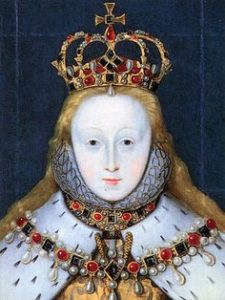Elizabeth was the first (and indeed last) single woman ever to sit on the throne of England and her arrival sparked a sexual revolution in the way that the court of England was run.
For the first time in English history a monarch had to rule by the power of personal charisma alone. Elizabeth was not a King by right of battle like her grandfather Henry VII, nor was she the chosen leader of a powerful faction. She inherited by default, and she had to keep her position by power of personality alone.
But this was almost impossible for a woman. All of the previous courtly rituals and circles of power and influence had depended on a male King with male favourites, who formed the intimate circle around him as courtiers and councilors, pimps, boozing companions and sometimes lovers. With a female monarch on the throne none of these roles could work. The councillors could not be her dining companions, her bedfellows, her jousting partners, her gambling friends, her buddies for a night on the town. Everything had to be different. It would still be a man’s world; but it would be headed by a woman.
To make this work Elizabeth would have to dominate the finest men of England. She did this in two ways: firstly, she kept tight control of her council and recruited only the most skilled men to be her advisors. She might have playmates, but the serious business of ruling was done by the serious men. Sir William Cecil she made her secretary of State and later years would see her add the brains and skills of his son Robert, the Bacon brothers, Sir Francis Walsingham, and many others.
But for her personal court she chose for looks and glamour, not for wisdom, and so gathered around her a court of men who were a by-word for sex appeal and indiscretion. Women companions she kept to the absolute minimum.
Elizabeth demanded a bachelor court. She was violently jealous and angry if any of her ladies had an affair with one of Elizabeth’s handsome young courtiers. Sir Walter Raleigh’s wife was banished from court for marrying him, Sir Robert Dudley’s first wife never came to court at all, and his second was married in secret and then all-but banned from her husband’s company as Elizabeth kept the man she loved above all other away from his home.
Elizabeth Vernon had to spend a week in prison for marrying without the Queen’s permission and the Queen physically attacked Mary Shelton and broke her finger when she discovered the girl was secretly married. In a court of hundreds of men, Elizabeth employed only thirty ladies in waiting who were required to wear black or white so that she would glow in contrast.
Elizabeth was not in love with the many men that she kept on their toes, circling around the star that she claimed to be. It was a combination of political skill, patronage, the tradition of courtly love, repressed sexuality and the towering vanity that was typical of the Tudors.
The so-called Virgin Queen would always have been a hyper-active flirt. Deprived of a mother’s care in babyhood, denied by her father, and emotionally neglected, Elizabeth grew up to be a woman who could never get enough attention. She earned the admiration of her court by her political skill, her brilliant mind, and her beauty. But when these faded she still insisted on being treated as the radiant scholar who first came to the throne.
Her court was feverishly flirtatious partly because that was how Elizabeth kept everyone interested in the court circle, and because she herself was feverishly energetic. Only those who could keep up with the pace were welcome at court.
She was ruling at a time when the tradition of falling in love with the monarch was still alive. Even if she had not delighted in the tradition of courtly love, the court would still have kept the pantomime of worship, as did every court in Europe. It was a sort of star-struck celebrity worship that had become a tradition. Elizabeth made it central to the reputation of her court, incorporating the rituals of courtly love into public pageants and masques and using it to enhance her own status as a half-holy being.
In her first years on the throne she was nearly overthrown by conspirators who were appalled at the risk of her marrying her lover Robert Dudley. After that narrow escape I think she never took a lover again, contenting herself with the passionate declarations of handsome young men, rich gifts from them (she was tremendously acquisitive) and a culture which rose to great heights of literacy and art in praise of her beauty. Her vanity and her powerfully repressed desire combined to create a hot-house of attention for her.
But Elizabeth was also an astute political ruler. She knew that she had to find some way of keeping the adventurous and daring young men of England interested in her reign and attached to her court. By creating a merry-go-round of favouritism and pique, in which one man’s wealth and opportunities would rise and another man’s fall according to how well they had charmed the Queen, she kept them continually striving for her attention.
Instead of creating great houses in the country and setting up power bases away from the court (as the French did) or becoming involved in foreign adventures, Elizabeth kept them tied to herself and dancing attendance at court. The great Elizabethan houses that they built were constructed to please the Queen, to house her on her annual tours of the country. Staggeringly expensive, Elizabeth’s demands for entertainment and hospitality took her hosts to the brink of bankruptcy and maintained their dependence on her as the only source of power and wealth.
Competition among her favourites was fierce. But because Elizabeth dealt with them as individual lovers, favouring and spurning them according to her declared whim (and to hidden political necessity) they could not safely ally with each other: they were always rivals. With exquisite female guile Elizabeth divided and ruled them while appearing to be nothing more than a weathercock to the changeable weather of her emotions. Clearly, they could not trust her, or rely on her favour; and they certainly could not trust each other. By appearing to be at the mercy of her emotions Elizabeth actually kept her courtiers divided and competing with each other, all at the mercy of her political plans.
Only a few men ever managed to breach this clever mixture of vanity and realpolitik. The first man to be linked with her was Lord Thomas Seymour, the husband of her stepmother who had been Henry’s last Queen: Katherine Parr. Seymour romped with the young Princess under the nose of his wife, perhaps he even sexually abused her. When he was accused of plotting for the throne she denied having an affair with him; but he gave her a liking for the rest of her life for dark-haired dangerous rogues.
Robert Dudley, her childhood sweetheart and perhaps her lover, turned her head so powerfully with his passion and his good looks, that she put her throne and herself in jeopardy for him, in the first years of her reign. Only when it became apparent even to a young woman passionately in love, that the affair would cause a rebellion, did she step back, and it was then that she swore she would marry no-one.
Of course, no-one believed her. Nobody thought that a woman had the courage, ability or mental toughness to rule a Kingdom all on her own, everyone was certain that Elizabeth – whatever her declarations to the contrary – would marry, when the right offer was made. But who would make the offer which would tempt a woman who needed support but would not sacrifice her independence, a woman who wanted to be loved as a woman but must be acknowledged as a Queen?
An English millionaire spent his fortune entertaining her, Erik of Sweden came with his badge of a heart stabbed with a diamond arrow, Philip of Spain her brother in law, the Hapsburg Archduke Charles, a claimant to the throne of Scotland, the child-King Charles IX of France, and the Duke of Anjou were all proposed and seriously considered as husbands.
All the while the young continued to dance attendance on her: Robert Dudley, Thomas Heneage, the Earl of Ormonde, Christopher Hatton, John Harrington, and Walter Raleigh, were all hard-working admirers who serviced Elizabeth’s need for male attention. Her last great love was the stepson of her first. Robert Devereux was introduced to court by Robert Dudley and proved to be the Queen’s most ill-judged flirt, leading a rebellion against her and ending his life on the executioner’s block. He was, perhaps, the only young man whose ambition she failed to convert to serve her own glory.
All the rest she managed to dominate. Indeed, any handsome man who could scrounge up a wardrobe sufficiently elegant to be admitted to court might catch her eye, and be on the way to a profitable place at court. The spin of admiration which surrounded her inspired artists, musicians, poets and dramatists: Edmund Spenser, Ben Johnson and William Shakespeare wrote to extol the beauty and charm of their patron the Queen.
What Elizabeth thought of this life that she had created for herself we can only guess from the record of her life. Clearly she had tremendous physical energy for dancing, hunting, walking and amusements. No doubt she also required also a continual buzz of sexual propositions. After all, she was the daughter of one of the most alluring women in English history – Anne Boleyn who managed by carefully judged sex appeal to keep the most powerful man in England jumping like a cat on a hot tin roof for six long years.
Equally, Elizabeth’s father was a man given to passionate first impressions and rapid desires. Elizabeth was a born flirt, she ran a flirtatious court because she enjoyed the chase. But there is no doubt that she used her allure and the cult of her charm as a method to rule. Since she could not be a King she had to find a way to make her rule as powerful and as potentially tyrannical as her father’s.
By employing young men in a state of feverish uncertainty she gained their energy without risking their power competing with her own. By taking them as putative lovers she broke any alliances they might have made, and by making the professional relationship of courtiers and monarch so passionately personal she kept them in a state of permanent insecurity in which every day they had to be on their very best behaviour. It was a triumph of her management skills that one woman, with little structural power, could dominate hundreds of men by sheer force of will.
Would it work for a modern woman? Perhaps, if modern men could be induced to flutter around a flame; but sadly for all those modern Virgin Queens out there: sexual harassment in the work place is mostly illegal, appointments on the basis of whim is regarded as unfair, and the private gifting of public funds is now considered to be corrupt. Elizabeth made flirtation a matter of public policy because she had to find a way to be a dominant woman in what had been a purely man’s world. Unlike her, no modern woman will ever face such intractable obstacles to progress, nor such susceptibility to her sex appeal.









